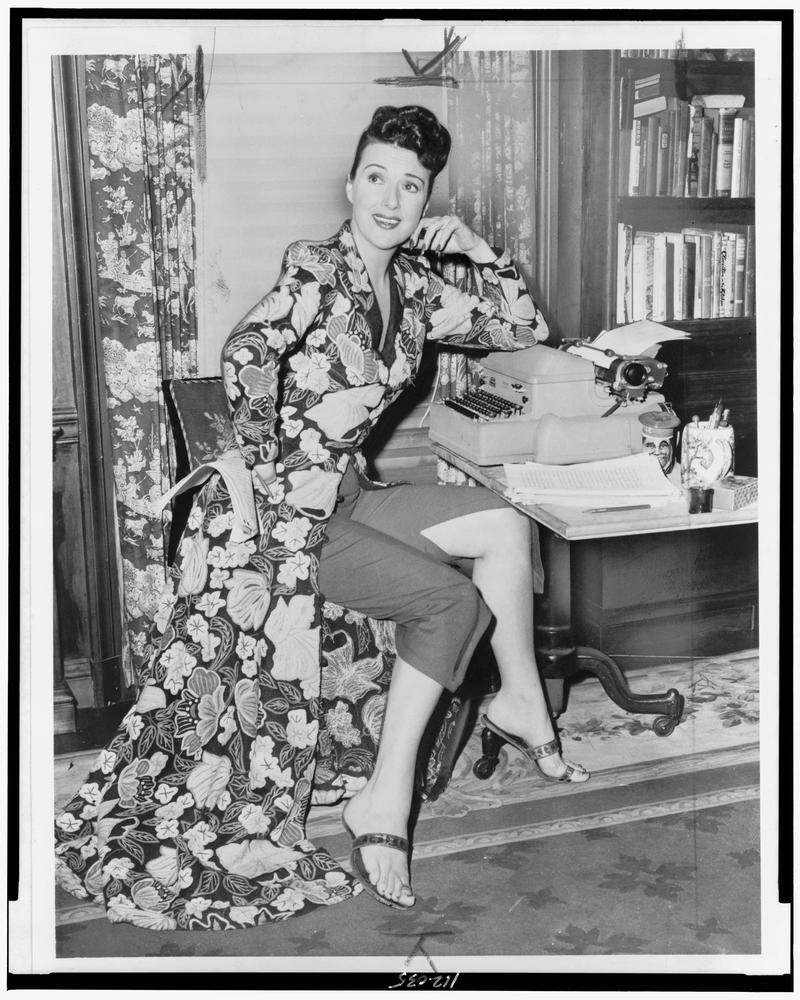Before It Was Trendy, It Was Scandalous: Burlesque Star Gypsy Rose Lee, 1957

Few writers begin their appearance at The Herald Tribune's prestigious Books and Authors Luncheon series by doing a striptease, but Gypsy Rose Lee feels it is expected of her.
After taking off her gloves, hat, and earrings she stops, there being no "row of bald men" for her to look out over. Squinting, refusing to wear glasses, confiding she has "40-year-old eyes and a 20-year-old body," she talks about her just-published memoirs, reminiscing in particular about her early days in show business, when she was second banana to her sister June and even more overshadowed by the imposing figure of "Mother."
She recounts being stranded in a small town in Washington and having Mother select the appropriate lodge pin from a box of many before going to see the local Grand Mogul and telling a sob story about being deserted by her husband, while June, a budding actress even at the age of 6, whimpered, "Mamma, I'm hun-gwy!" This glimpse of early, hardscrabble days of vaudeville is set in contrast against the curiosity and, to some extent, esteem the burlesque star was held in by the time of this 1957 appearance. In her introduction, the mistress of ceremonies, Irita Van Doren, reads several of the headlines Gypsy Rose Lee had since garnered, ranging from "She Wows Chicago by Letting Her Shoulder Strap Slip" to "Gypsy Rose Lee Reads Proust!"
Gypsy Rose Lee was born Rose Louise Hovick in 1914. Along with her sister June (who became the well-known actress June Havoc) she was the focal point of her mother's ferocious show business ambitions. "Madam Rose," as the website HistoryLink.org records:
…taught the girls to lie about their ages to truant officers and railway train conductors, steal blankets and sheets from hotels, and sneak out without paying. The girls were practiced shoplifters. Madam Rose wasn’t above sabotaging rival acts and was masterful at conning well wishers out of money with her genteel, brave-but-helpless single mother act. June later said that after the age of 5, she never believed anything her mother said. A tiny, delicate-looking woman, Rose nevertheless once managed to push a hotel manager out of the window.
After June, the more accomplished performer, eloped, and once vaudeville began to collapse, Mama Rose guided her remaining daughter into the world of burlesque, where she quickly became a sensation. Alden Whitman in The New York Times attempted to describe what set her act apart from the average striptease of the day:
Sensuous and statuesque…she eschewed the traditional crudities of burlesque. Instead of stripping perfunctorily she divested herself of her garments (or virtually all of them) with a high degree of panache. She called it art and few disputed her.
Gypsy managed to parlay her success into a wide-ranging celebrity. She became a media sensation, hobnobbing with intellectuals like Carson McCullers, Janet Flanner, and W.H. Auden. She wrote a mystery novel, The G-String Murders (1941), and appeared in the hit revue "Star and Garter" (1942.) But it was the book she is heard publicizing in this talk, Gypsy, A Memoir (1957), that led to her subsequent fame. In addition to being a best-seller, it provided the basis for the Broadway show Gypsy (1959), considered by many to be the greatest American musical ever made. Nowhere is Gypsy Rose Lee's shrewd sense of what the public wanted displayed more clearly than in the story's softening of her mother's behavior. Karen Abbott, the author of American Rose (2010), speaking on NPR, says of both Gypsy and her sister June:
Those girls were abused, in a way. They didn't have any schooling; they were not brought to doctors or dentists. Their mother pitted them against one another, and taught them to trust no one but her. Especially men -- there was a whole theme of distrust of men running through that family. [June says] pretty frankly that her mother was mentally ill and that today there would be help for her.
Indeed, when Rose Thompson Hovick died in 1954, she threatened to "drag [Gypsy] into death with her." None of this squares with the grudgingly admiring "force-of-nature" portrait painted in the book. Perhaps the most insightful comment on the memoir and the myth it spawned came from John Steinbeck: "I found it irresistible. It's quite a performance. I bet some of it is even true, and if it wasn't, it is now."
With the money she made from the musical, Gypsy Rose Lee moved to Beverly Hills, where she spent her remaining years making celebrity appearances, gardening, and raising dogs. When she learned she had lung cancer, in 1969, she told her sister June, "This is my present, you know. My present from Mother."
Gypsy Rose Lee died in 1970, at the age of 56.
Audio courtesy of the NYC Municipal Archives WNYC Collection.
